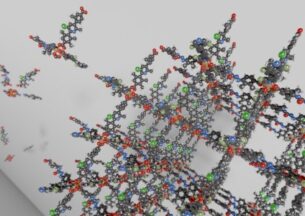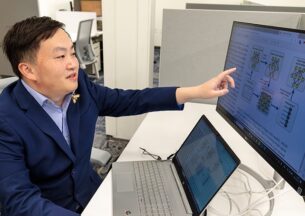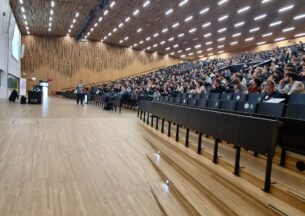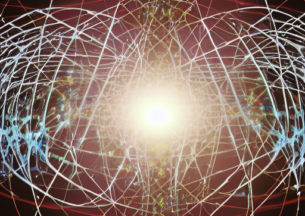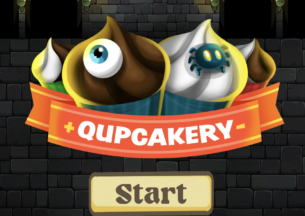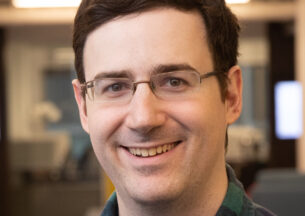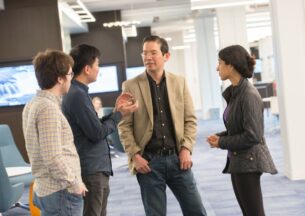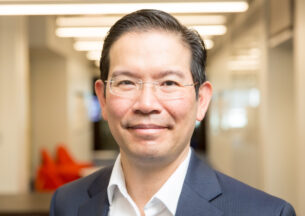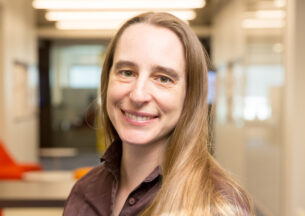EPIQC Grad Students Win Best Poster Award for Research on Qutrits
The fundamental unit of quantum computing is the quantum bit, or qubit — the quantum version of the classic binary bits that underlie today’s classical computers. Where traditional bits store information as either a 0 or 1, a qubit adds the extra wrinkle of superposition, where it can be both 0 and 1 simultaneously. While this new feature could potentially open up entire new vistas of computational ability, a new award-winning poster by UChicago CS graduate students proposes an additional upgrade: what if you turned the bit into a trit?
The qutrit, a quantum unit that can occupy three states instead of two, was the star of a poster by Enabling Practical Scale Quantum Computing (EPiQC) students Pranav Gokhale, Jonathan Baker, and Casey Duckering with EPiQC PI Frederic Chong. The research was one of three sharing the “Best Poster” award from out of over 400 posters at the 2019 Quantum Information Processing (QIP) meeting in Boulder, Colorado this January.
While the qutrit is not a new concept, it has remained under the radar in quantum computing due to concerns about its error-prone nature and technical limitations. But with their poster, Gokhale and his co-authors demonstrate how the surprisingly large benefits created by using qutrits in one of the essential building blocks of quantum algorithms can easily outweigh the drawbacks.
“Qutrits are physically feasible, but they haven't really been thought of as that promising, because they are a lot harder to operate,” Gokhale said. “Traditionally, people thought of them as only being mildly interesting, bringing modest improvements, but nothing significant enough to merit their experimental use.”
On the poster, the authors demonstrate how using qutrits instead of qubits can dramatically improve the construction of a Toffoli gate, a reversible logical circuit that is an essential piece of quantum algorithms important for search and cryptography. These improved qutrit circuits eliminate the need for ancilla bits — extra parts that are necessary for error correction but aren’t directly involved in computation. Where a 50-qubit machine today might actually only use 25 qubits for processing data, a switch to qutrits might unleash the full power of the hardware.
“Normally, if I give you a quantum computer, you might have to use half of the bits for ancilla that just support your actual computation, so you're not really operating at the frontier of what that hardware could theoretically do,” Gokhale said. “We want to get back on that frontier line where every single hardware qubit is actually used as a piece of data instead of just an artificial ancilla bit and that’s what this strategy lets us do.”
The poster also made the case for qutrits on the two leading approaches for quantum computing hardware today. Through simulations on classical computers, the team demonstrated improvements ranging from twofold to 10,000X on both superconducting and trapped-ion hardware. Those results attracted the attention of experimentalists at the QIP meeting, hopefully inspiring future tests of qutrits on the current and near-term quantum computers under development at universities and tech companies.
The research fits well within the core mission of EPiQC to shorten the path to practical quantum computers, and throws a spotlight on one of the reasons why the quantum era is so unprecedented and exciting to computer scientists. By reimagining what the most basic unit of a computer can do, qutrits could be a key step for bridging the gap between today’s buggy hardware and tomorrow’s quantum algorithms.
“In current quantum hardware, qubits are scarce and every bit counts,” said Chong, the Seymour Goodman Professor of Computer Science at UChicago. “These results mean that we will be able to run quantum programs on smaller and less reliable quantum machines, which will make practical quantum computing happen sooner.”




